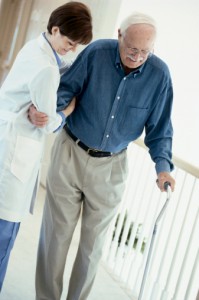By John L. Brusch M.D., Associate Chief of Medicine, Cambridge Health Alliance
Falls are common among adults older than 65. An estimated 14% of older adults in Massachusetts reported falling in the past three months. In about a third of these cases, they suffered an injury that needed medical care or restricted their usual activities for at least a day. Injuries from falling can include bruising, hip fractures, head trauma, or major lacerations. Sometimes complications from falls can be fatal— they are the fifth leading cause of death in older adults. Even the mere fear of falling can adversely affect elders, who may restrict their activities to avoid possible injury. Such social isolation can lead to significant physical and emotional consequences.
 The significance of a fall often goes unrecognized for several reasons. An individual often does not tell his or her healthcare provider about the fall, especially when there has been no significant injury. The healthcare provider may not inquire about a history of falls. Even when the healthcare provider is made aware of the fall, there is often no investigation into its cause, because both the patient and provider may regard falling as a normal part of aging. However, falls are preventable in large part.
The significance of a fall often goes unrecognized for several reasons. An individual often does not tell his or her healthcare provider about the fall, especially when there has been no significant injury. The healthcare provider may not inquire about a history of falls. Even when the healthcare provider is made aware of the fall, there is often no investigation into its cause, because both the patient and provider may regard falling as a normal part of aging. However, falls are preventable in large part.
We should think of a fall as a “dashboard warning light.” It warns us that there are probably one or more causative factors that should be addressed. The home environment should be surveyed for risk factors such as scatter rugs, extension cords, and poor lighting. Medications, especially antihypertensives, diuretics, sleeping medications, antidepressants, and antipsychotics, are commonly implicated. Alcohol use, not abuse, is also often overlooked as a cause. The individual should undergo a thorough physical examination with special attention paid to their joints, muscle strength, vision, cognition neurological, foot problems, and balance. Usually it is not just one but a combination of these that are awry.
Community Resources for Elder Wellness (CREW) is a coalition of Cambridge and Somerville agencies, including the Departments of Public Health, Councils on Aging, Visiting Nurse Association of Eastern Massachusetts, Somerville-Cambridge Elder Services, and Cambridge Health Alliance which serves to coordinate senior care initiatives in these two cities. CREW conducts ongoing educational efforts, the Stay Strong in-home fall prevention program, and fall screenings. Cambridge Health Alliance routinely screens seniors in its ambulatory sites and provides Fall Clinics that comprehensively assess fall risk.
If a senior has fallen within the past 6 months or is fearful of falling, that person should tell his/her healthcare provider and request an evaluation for the cause of the actual fall or for his/her fear of falling. Because seniors are often reluctant to bring this issue up to their physicians, discuss with the individual to see whether they would like someone to come with them to act as an advocate. Talking with a provider will help to coordinate fall prevention efforts, which can include lifestyle changes like appropriate exercise and being aware of safety hazards at home and in the community.
More information about fall preventative and screening programs is available through Somerville-Cambridge Elder Services (617-628-2601). The Centers for Disease Control and Prevention and the National Council on Aging are also helpful fall prevention resources, and can help direct you to evidence-based programs like A Matter of Balance and Otago.
What fall prevention programs have you seen in action? What do you think would best help prevent falls among older adults in Massachusetts?
